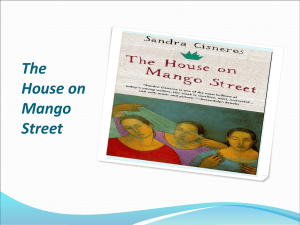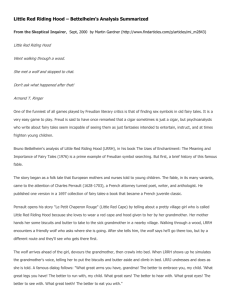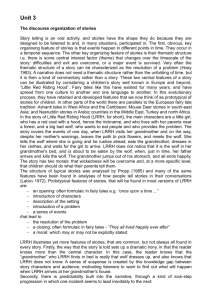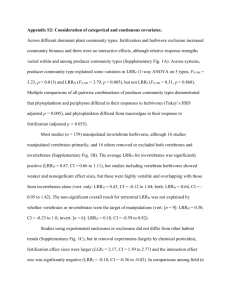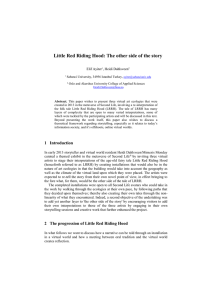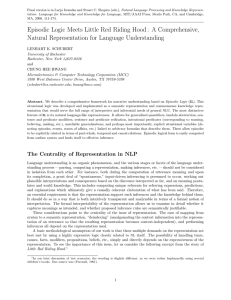21. LITTLE RED RIDING HOOD AND THE FREUDIAN WOLF (4/26)
advertisement
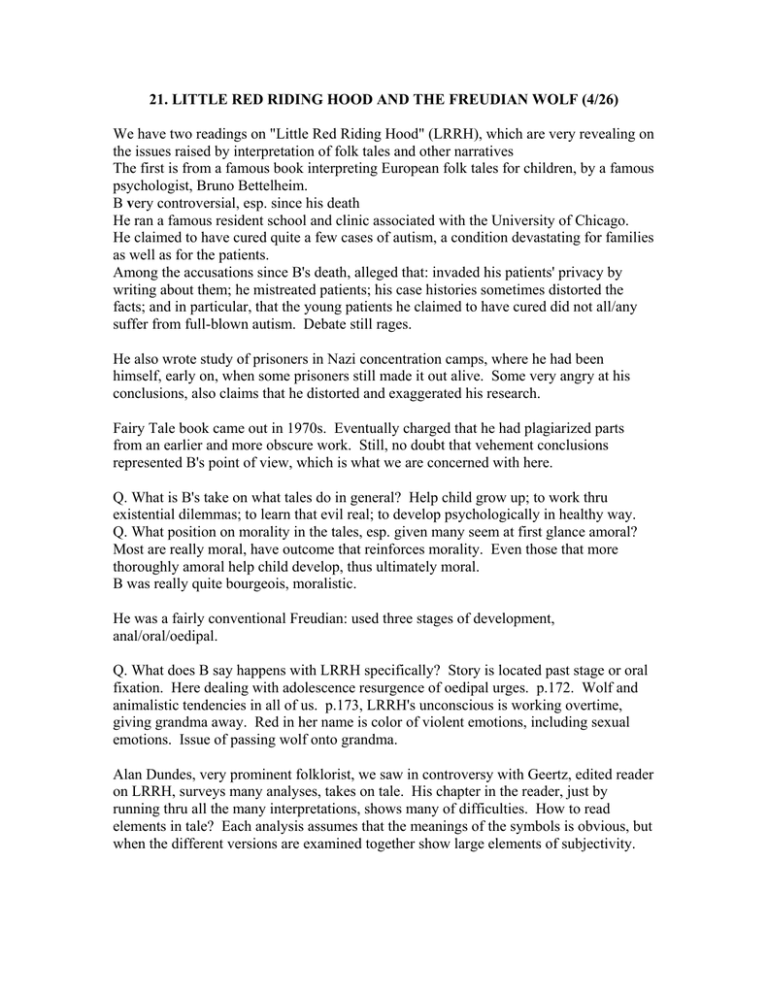
21. LITTLE RED RIDING HOOD AND THE FREUDIAN WOLF (4/26) We have two readings on "Little Red Riding Hood" (LRRH), which are very revealing on the issues raised by interpretation of folk tales and other narratives The first is from a famous book interpreting European folk tales for children, by a famous psychologist, Bruno Bettelheim. B very controversial, esp. since his death He ran a famous resident school and clinic associated with the University of Chicago. He claimed to have cured quite a few cases of autism, a condition devastating for families as well as for the patients. Among the accusations since B's death, alleged that: invaded his patients' privacy by writing about them; he mistreated patients; his case histories sometimes distorted the facts; and in particular, that the young patients he claimed to have cured did not all/any suffer from full-blown autism. Debate still rages. He also wrote study of prisoners in Nazi concentration camps, where he had been himself, early on, when some prisoners still made it out alive. Some very angry at his conclusions, also claims that he distorted and exaggerated his research. Fairy Tale book came out in 1970s. Eventually charged that he had plagiarized parts from an earlier and more obscure work. Still, no doubt that vehement conclusions represented B's point of view, which is what we are concerned with here. Q. What is B's take on what tales do in general? Help child grow up; to work thru existential dilemmas; to learn that evil real; to develop psychologically in healthy way. Q. What position on morality in the tales, esp. given many seem at first glance amoral? Most are really moral, have outcome that reinforces morality. Even those that more thoroughly amoral help child develop, thus ultimately moral. B was really quite bourgeois, moralistic. He was a fairly conventional Freudian: used three stages of development, anal/oral/oedipal. Q. What does B say happens with LRRH specifically? Story is located past stage or oral fixation. Here dealing with adolescence resurgence of oedipal urges. p.172. Wolf and animalistic tendencies in all of us. p.173, LRRH's unconscious is working overtime, giving grandma away. Red in her name is color of violent emotions, including sexual emotions. Issue of passing wolf onto grandma. Alan Dundes, very prominent folklorist, we saw in controversy with Geertz, edited reader on LRRH, surveys many analyses, takes on tale. His chapter in the reader, just by running thru all the many interpretations, shows many of difficulties. How to read elements in tale? Each analysis assumes that the meanings of the symbols is obvious, but when the different versions are examined together show large elements of subjectivity. Q. Does D agree with B on anything? Would probably agree on primacy of oral versions of the tales as opposed to published. (B very big on having tales read out loud). Both fully committed Freudians. Otherwise they disagree completely. Q. What are D's big points? Must take all variants into account. Including even Asian variants. I myself thought inclusion of Asian versions was probably a bit forced until I saw specific resemblances. (This demand is from point of view of professional folklorist; leading from discipline’s strength. Non-professionals are always going to be much weaker than they are on this point.) D says one must know past interpretations, otherwise one is doomed to repeat past errors and ideas, reinventing the wheel. Most writing on LRRH has been based on versions published by Grimms and Perrault. Even those like B who snotty about depending on Perrault are guilty of using bastard version in Grimms' collection. Q. What does D say about the Grimm version? It is a combination of several variants that the Gs had collected, thus inauthentic and a major step away from oral. Q. What is D's own take on LRRH and issues raised? Story is very infantile, is childish not adolescent. Emphasizes all the different urges involved. D is also a pretty orthodox Freudian. Today few people who write about such issues accept Freud so complacently. He has come in for tremendous criticism, concerning validity of his theories, of his cases histories, etc. Even those who defend F unlikely to take his theories for granted. E.g. confidence that a tale can be related to a particular stage of psycho-sexual development. On other hand, after reading LRRH and all variants, esp. some of Asian ones, hard not to think that has something to do with sexuality, violence, defecation etc. Q. Where is D on issue of universal interpretations vs. those specific to one culture/moment. Very universalistic. But then, in different way, so is B. D scornful of theorist Zipes, who relates LRRH to particular period in European history. Q. So what issues does this debate raise concerning the difficulties of interpretation? Problems concerning the text and version use. What is authentic? What is representative? Does it matter? Fundamental problems reading the elements in the story: Is the wolf Daddy? Or is the Woodsman daddy? or both? How do we decide with any degree of confidence? Is grandma to be read as a disguised form of mother? Problems of reading import of elements and situations, esp. because the story is not in itself realistic (wolves don't talk), but at another level almost all analysts assume that it relates to or is about real issues. Does it matter that LRRH is naive, that she so gullible with wolf? Is that just incidental to the story, or is crucial element, or maybe we should assume she not naive, she knows what wolf up to whole time. ?? D is scornful of Eric Berne (was a well known pop psychologist), but Berne's questions seem relevant from one point of view. Issues of universal vs. particular. D wants a meaning that attaches to all variants. But why can't meaning change with variants? Why assume there is one true core, almost like a Platonic ideal? Why not relate a variant, as Zipes does, to one time or place? Many literary theorists see, e.g. figure of Cleopatra or Jesus changing with times. But then if embrace local, particular interpretations, why is the tale so widespread? Can one really keep one's sights restricted to local? Next time we will probably use two other books on LRRH: Catherine Orenstein, Little Red Riding Hood Uncloaked (2002, Basic Books); Zipes, The Trials and Tribulations of Little Red Riding Hood (1993, Taylor & Francis).
